- Home
- John Bellairs
The Face in the Frost Page 2
The Face in the Frost Read online
Page 2
Prospero stood under the lamp, staring out into the moonless night. At first, he saw only vague shapes, some darker than others, but before long, he became aware of a small figure standing halfway down the flagstone walk. As Prospero watched, the figure raised a threatening arm and spoke in a deep voice:
"Kill them all!"
At this, Prospero did a strange thing. He began to smile. His long wrinkled face, which had been set in a tense frown, was now creased by a delighted grin.
"Kill who all?" he asked in an amused voice.
"All those blasted, pesty, nitty insects!" the figure roared. "If yellow light attracts moths the size of horse blankets, why don't you get a purple lamp or a green lamp? At least let me smash the one you have!"
Still grumping, the person on the walk came forward until he stood in the light. Prospero saw a short, burly, middle-aged man with a close-trimmed dark-red beard; the hair on his head was beginning to get gray, and it was hard to tell whether he was going bald or just wearing a badly overgrown tonsure. The monkish aspect was also suggested by a mud-splashed brown robe, over which a shiny rain slicker was thrown. But, instead of sandals, the man wore scuffed brown walking boots. In one hand, he held a dripping sou'wester rain hat, and in the other, he held a long brass-tipped staff. A fat brown valise crouched at his feet, like an absurd and lumpy short-haired dog. It was Roger Bacon, one of Prospero's best friends and a pretty good sorcerer in his own right. He had been in the North Kingdom for the last three years, and before that, he had been in England for three years. But, you would have thought the two men had not seen each other in fifty years, the way they pounded each other on the back, bellowing wisecracks about falling hair and midriff bulge. When the welcoming uproar had subsided, Prospero stepped back and made a deep, comic bow.
"Welcome, noble friar! And, when did you return from the land of ice and mist?"
"Just tonight. A fishing boat put me ashore on, the coast, and I found my way here as well as I could, I got-"
Suddenly, Roger looked up, because some movement near the porch ceiling caught his eye. A huge gray moth, at least two hand spans across, came flapping down from the shadows. It went straight for Prospero, and before he could raise his hand, it had plastered itself against his face. Roger gave a sharp cry and rushed forward, shooing at the thing until it dropped to the floor with a light plop and an unpleasant rustling sound. But, before Roger could step on it, the moth rose, dived once at his head, ad then floated off into the night. The two men stared after it for a full minute, and when Roger turned to look at Prospero, he saw that his face was pale, even in the yellow light. And, his hands were trembling.
"Look here," said Roger in a worried voice. "I wish you'd tell me what's going on. You're not normally scared of insects, but then that was no ordinary moth. I've never seen one like it."
Prospero sighed and robbed at his face with both hands, "I'd tell you what was going on if I knew. I've never seen anything like it either. It smelled like a basement full of dusty newspapers. But, the smell isn't the worst thing about it."
"That's true," said Roger, looking up at the porch lamp. "It never came close to me and I was scared of it. Well, it's just more of what I felt when I got here two hours ago, and-"
Prospero stared at him. "Two hours ago! Why didn't you come in?"
Roger took a deep breath and let it out slowly. "As soon as I came through the gate, I knew that something else was here, something that had nothing to do with you or your spells. So, I poked around out here in the rain in hopes of catching the thing or at least finding out what it was."
"And, did you find anything?"
"No. Out by the fountain, I scared off something that might have been a dog, though it didn't look like one: It stood near the edge of the forest and stared at me for a moment, but when I threatened it with my staff, it ran away. There were sounds in the tall grass and in the bushes. All this in the wild rain, and your house all lit up. It was a bit like a dream I used to have as a child: I would be chased around and around the outside of my house by a tall, formless dark creature; every window in the house was brightly lit and yet I couldn't go in. Of course, I could have come into your house if I had wanted to. But, I felt you were safe; the thing was outside."
"It had been inside," said Prospero grimly. And now, it was Roger Bacon's turn to stare.
Prospero decided right then that a little false courage was needed-otherwise the two of them would spend the rest of the night looking in closets and under tables.
"Come on inside," he said. "The ghastly grimling is gone, at least for the time being, and we have a lot of talking to catch up on. It's getting chilly, so why don't you start a fire, and I'll go downstairs-" He paused and laughed. He was not frightened now and he was genuinely amused at himself. Roger, naturally, still looked puzzled, "Never mind," Prospero went on, "I'll explain later. Anyway, as I was saying, I'll go downstairs and get a bottle of good red wine and some of that hundred-year-old brandy you had the last time you were here. And well see what we can do to that large Cheshire cheese in the kitchen. How does that sound?"
"Fine," said Roger, and he started to take off his heavy raincoat.
Before long, the two of them were comfortably planted in two large, sagging easy chairs drawn up before a warm fire, which sometimes burned bright sea green or deep cobalt blue because of salts that Prospero had thrown onto the logs. Between the chairs was a small octagonal table holding a dusty green wine bottle, a rapidly diminishing half wheel of cheese, and a plate of crackers. Roger Bacon had been telling about some of his more notable successes in England, and now, he began to tell, with equal delight, some stories about his more egregious failures.
"... and so, I went to work on a brazen head that was going to tell me how to encircle England with a wall of brass, to keep out marauding Danes and other riffraff. I think something went wrong when i didn't put enough yellow regulus of phosphorus in-or maybe there was too much astatine permanganate. Anyway, I got a head that was at least as talkative as your mirror ..."
"I heard that!" yelled a voice from upstairs.
"You be quiet," shouted Prospero over his shoulder. "Why don't you go watch late movies or something?"
There was silence upstairs, followed shortly by the muffled sound of bird imitations.
"Anyway," Roger went on, munching a piece of cheese, "the head did talk a lot, but unlike your mirror it was deaf as a ... as a ..."
"Brass post?" put in Prospero helpfully.
"Yes," muttered Roger, giving him a dirty look. "You might say so. Well, I asked it how to make a brass wall to encircle England, and it said 'Hah?' 'Brass wall,' I said, louder. 'В as in Bryophyta ..."
"Bryophyta?" Prospero asked.
"Yes," answered Roger testily, "mosses and liverworts."
"I hate liver," said Prospero.
"As well you might," said Roger in a quiet, despairing voice. "As well you might. But be that as it may, I spelled it out. R as in rotogravure process ..." He waited, but Prospero, who was biting down hard on his pipe to keep from laughing, did not interrupt."... A as in Anaxagoras, S as in Symplegades, and S as in Smead Jolley, the only baseball player in history to make four errors on a single played ball."
"And, what did the head say?"
"It said 'Umpf' or something like that, and then it started to rattle off a long formula, which I may have copied wrong. Or, maybe the head didn't know what it was talking about. At any rate, when I chanted the formula the next day, down by the seashore, I heard a sound like crumhorns and shawms, and behold! All of England was encircled with an eight-foot-high wall of Glass!"
"Class? Plain, ordinary glass?"
"Yes, and not very good glass at that. Paper-thin and full of bubbles and pocks. The first boatload of Vikings that came over after the wall went up turned around and went back, because it was a sunny day and the wall glittered wonderfully. But the next day, when they came back, it was cloudy. One of them gave the wall a little tap with an ax, and it wen
t tinkle, tinkle, and now, there is a lot of broken glass on the beach. Not long after that, I was asked to leave."
Prospero could not think of anything adequate to say, so he suggested that they break out the brandy and cigars.
They talked on into the night, and the large candle in the corner, shaped like the head of a mournful monk, got sadder and sadder looking. But, as the candle got scowlier, the two men became more delighted and talkative, so that Prospero finally felt up to telling Roger about the cloak in the cellar. Roger listened with a concerned and sometimes frightened look on his face, and when the story was over, he put his brandy glass down and waited a bit before he spoke.
"You don't mention the moth, but I suppose that neither of us has to dot such a large i. Has anything else happened?"
Prospero nodded. "Last night I dreamed that I was still in bed, but wide awake, staring at something near the foot of my bed. I stared for a long while at the vague shape, and I gradually made out the form of an old man standing there. When he came forward into the moonlight, I could sec that he was watching me with a scornful smile-it was a cruel, cynical face, the arrogant face of a man who is secure in some superior power or knowledge. Without saying anything, he went to the window, which was bright with the light of a full moon. And then, he began to write on the windowpane with his index finger, and it seemed to me that each stroke of his finger cut into the glass like a diamond. For some reason, although the words glowed, with a silver light, I couldn't get any meaning out of the writing. I strained my eyes and stared, but it all seemed like nonsense. Then, the old man turned to me and said, 'Can you read what I have written?' When I said that I could not, he laughed a low, mocking laugh and his whole face contorted in a contemptuous sneer. That is unfortunate' he said, in a cold voice. 'You will suffer because of your ignorance.'
"At that point, I woke up. The room was bright with moonlight, but of course there were no words on the window and, as far as I could tell, there was no one in the room. So, I went back to sleep again, and I'm not sure how long I slept, but I was awakened by the sound of someone tapping on my window. It was a sharp, metallic sound, not like someone rapping with his knuckles, and I sat up with a start. When I looked at the window, which is not very far from my bed, I saw that there was a large bird outside on the sill. And, a second later I saw that it was not an ordinary bird. It was skeletal. The gray light was shining through its rib cage and its eye holes; it was pecking at the pane and clattering its horrible black wings against my window I was suddenly seized with the fear that it would break through the glass at any minute and get in, and I jumped out on the opposite side of the bed. I got hold of my staff, which was leaning against the wall near the bed, and I muttered some kind of charm, I forget what. It didn't work, but a minute or two later the bird gave an awful scraping cry and fell over backward, off the sill."
Roger opened his mouth to say something, but Prospero raised his hand.
"I know what you're going to say. But, the bird was not in a dream. I sat there on the edge of the bed for some time after the thing vanished, but I finally did get some sleep. The next morning-this morning–I looked to see if the bird had left any mark on the ground where it fell. It had. The grass was crushed down in one spot under my window. It wasn't a dream, and these things-the bird, the moth, and the cloak-are not just apparitions."
"I don't see what you mean."
"Roger, you know as well as I do that apparitions, evil or otherwise, are abroad in the world. You have put them down with incantations and so have I. But, these things were tangible-they were real in a way that a ghost is not. Have you ever gotten close enough to an apparition to try to touch it?"
Roger thought for a minute. "Well," he said, "I once had to put to rest the ghost of an old woman who was haunting a village south of here. She had been a witch, and her power to return came from a little wooden charm she had hidden under the floor of her house. I found it and decided to burn it in the town square-with the proper ceremonies, of course. When I set fire to the amulet, she appeared and rushed at me with her arms raised. She had long hooked nails and looked as though she wanted to scratch my eyes out."
"And, what did you feel? Did she touch you?"
"She passed right through me. There was a cold breath, but not much else."
"Exactly. But, these things could be felt and smelled. That evil gray cloak never touched me, but it must have been as palpable as the others. It had a dead smell about it, and it made a swishing sound as it moved across the floor. And, there was something else, something that you must have felt when the moth appeared. You said that you were scared by the moth, even though it didn't come near you. Do you know why you were scared?"
Roger looked nervously around the dark room.
"I felt that there was someone there. I felt the power of some incredibly hateful will, a human will that wanted to kill you. And just before the moth flew away, I felt the will grow fainter."
"Not quite ready," said Prospero with a sour smile "Whoever he is, he can't do what he wants to do just yet. If there is such a he, that is. We may be wrong about all this. Anyway, we ought to talk about something else. There's nothing more maddening than empty speculation."
Roger sat up in his chair. "Good Lord! I had forgotten all about the notes I brought you. On the book."
"Book?" said Prospero.
Roger looked at him in exasperation. "Yes, book! Remember? Just before I left for England you asked me to trace that book, the one written in the cipher that no one had been able to crack. Well, you were right. The book has been in England and may still be there, for all I know, though I couldn't locate it. It had been in several castle libraries and was mainly thought of as a curiosity. Most of the old scholars I talked to thought the book must be some kind of practical joke, an elaborate sport. It made its way from one library to another because people borrowed it and never returned it. Not that anyone tried to get it back. No one in England took the book seriously, as far as I know, except one monk at Glastonbury Abbey. He has been dead for about fifty years now, but I found his notebooks under a pile of old papers in the abbey's archives. When you read what he has written, you may think that he was a little crazy. But, I don't think so. Here, let me get the papers for you. I couldn't bring his actual notes, but I copied out everything pertaining to the book."
Roger got up and went to the hallway, where he fumbled about in his raincoat for a while. When he came back, he was holding a bundle of rain-spotted foolscap sheets that were covered on both sides with his neat uncial script. Prospero refilled the brandy glasses, and he had just risen from his chair to look for his watch when a small marble clock high up on a dark shelf near the ceiling struck two, Not bong-bong, but clunk-clunk, since Prospero had stuffed the bells with paper to keep them from waking him up. When the muffled striking had finished, two wooden doors opened tn the front of the clock and a small brass cannon rolled out. The spring-action barrel fired two metal pellets which flew across the room into the open mouth of a bust of Aristotle. The philosopher's eyes blinked red twice as the pellets went down his throat. Gulp-gulp, ping-ping. Roger stood staring at the spectacle.
"I do not think, Prospero," he said, "that one should attribute a very high degree of reality to your house."
"That clock is altogether too real," said Prospero. "I think I will have to stuff Aristotle's mouth with paper."
"You might try not winding up the clock," said Roger.
"Oh, my no!" said Prospero, dead panning. "What would the clock think?"
The two men sat down again, in the easy chairs. Prospero had brought a large floor candelabrum from the other room, and he had placed it between the two chairs. Now, he began to read by the wavering shadowy light. He mumbled the first few lines of the first page to himself and looked up.
"This seems to be a very thorough description of the book. Is it from a catalogue of some sort?"
"Yes," said Roger. "The monk kept a descriptive list of all his books. Most of the entries are
very brief and limited to standard descriptive terms, but this note is quite elaborate, and it certainly goes beyond the kind of thing you'd expect to find in a book list. The rest of the material you have there I copied from a diary he kept. I didn't include anything that did not pertain to the book. At first, there are just a few scattered notes, but later he writes about the book obsessively. You will see why."
"You do know how to arouse curiosity," said Prospero, smiling "Why don't I read this aloud? I hate long silences as much as you do, and we both enjoy being read to."
"Very well," said Roger, sitting back. "Anyway, I haven't read the thing since I was in the archives at Glastonbury. Read on."

 The Curse of the Blue Figurine
The Curse of the Blue Figurine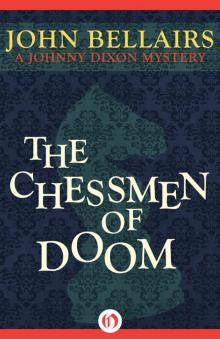 Chessmen of Doom
Chessmen of Doom Secret of the Underground Room
Secret of the Underground Room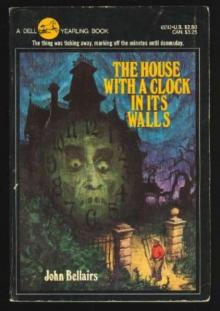 The House With a Clock in Its Walls
The House With a Clock in Its Walls The Vengeance of the Witch-Finder
The Vengeance of the Witch-Finder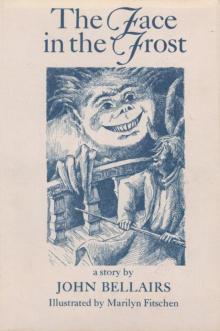 The Face in the Frost
The Face in the Frost Revenge of the Wizard's Ghost
Revenge of the Wizard's Ghost Spell of the Sorcerer's Skull
Spell of the Sorcerer's Skull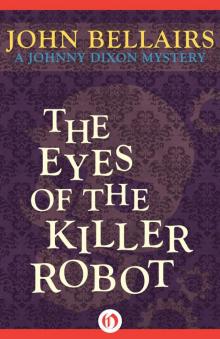 Eyes of the Killer Robot
Eyes of the Killer Robot Mummy, the Will, and the Crypt
Mummy, the Will, and the Crypt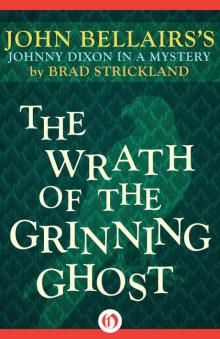 Wrath of the Grinning Ghost
Wrath of the Grinning Ghost The Mansion in the Mist
The Mansion in the Mist The Doom of the Haunted Opera
The Doom of the Haunted Opera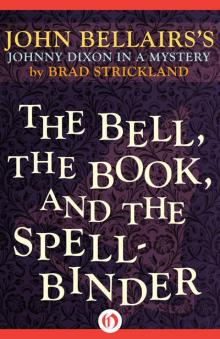 The Bell, the Book, and the Spellbinder
The Bell, the Book, and the Spellbinder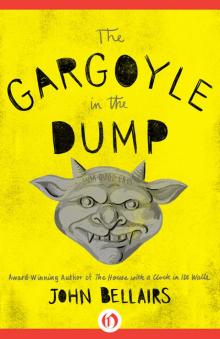 The Gargoyle in the Dump
The Gargoyle in the Dump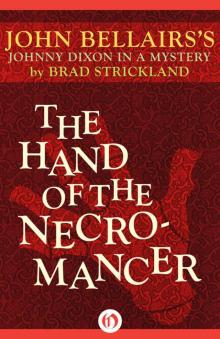 The Hand of the Necromancer
The Hand of the Necromancer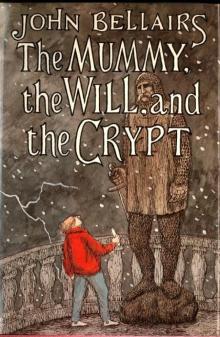 The Mummy, the Will, and the Crypt
The Mummy, the Will, and the Crypt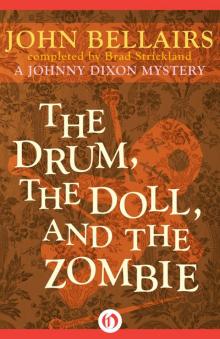 Drum, the Doll, and the Zombie
Drum, the Doll, and the Zombie The Specter from the Magician's Museum
The Specter from the Magician's Museum The Letter, the Witch, and the Ring
The Letter, the Witch, and the Ring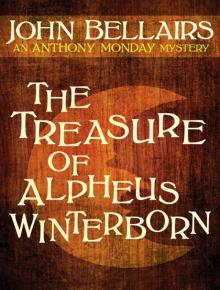 The Treasure of Alpheus Winterborn
The Treasure of Alpheus Winterborn The Dark Secret of Weatherend
The Dark Secret of Weatherend The Figure in the Shadows
The Figure in the Shadows